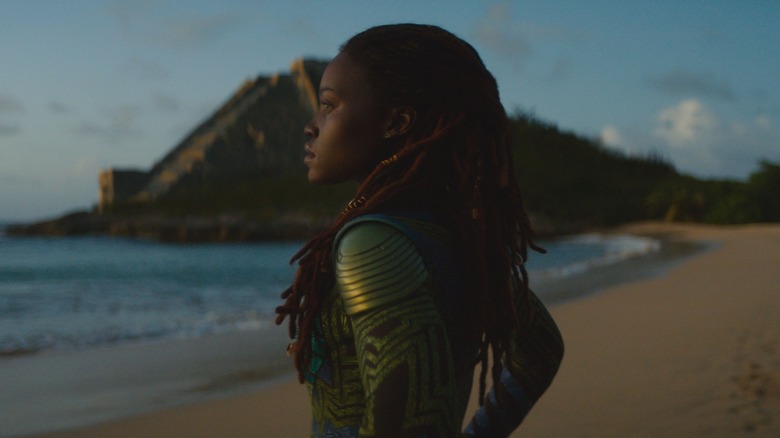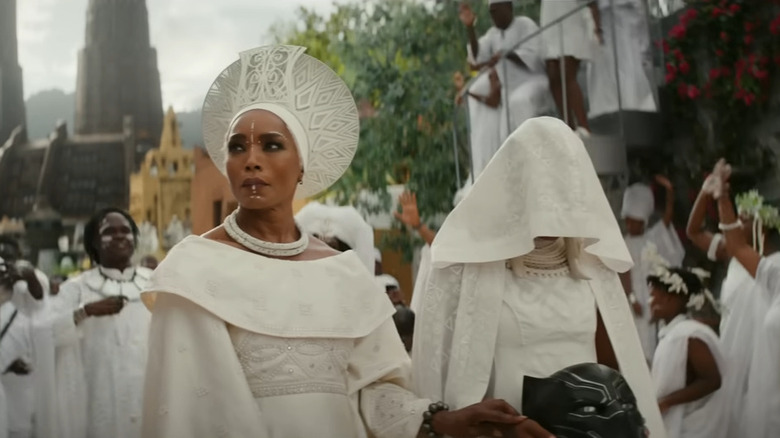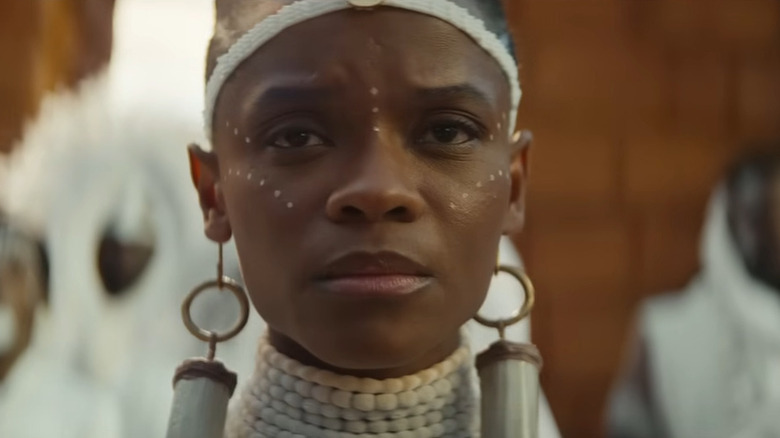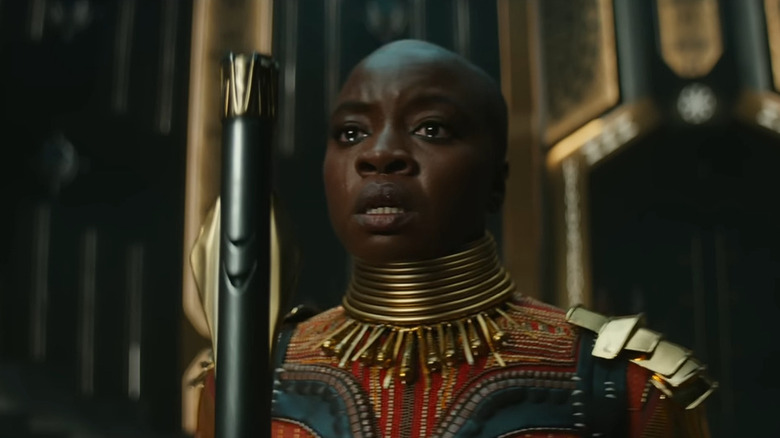Black Panther: Wakanda Forever Is About More Than A Single Marvel Superhero
The character of Black Panther, as played by the late Chadwick Boseman, was first introduced into the Marvel Cinematic Universe in the 2016 film "Captain America: Civil War." That film was about a conflict between two factions of superheroes over whether or not superpowered freelance vigilantes should be allowed to continue their regular operations without oversight. Black Panther, aka T'Challa — then the prince of the fictional country Wakanda — teamed up with Iron Man in the conflict, arguing that oversight was indeed required.
Those themes of a superhero community operating within a larger, global system extended into Ryan Coogler's 2018 film "Black Panther." In that film T'Challa became king of Wakanda, a country that rests on top of a store of magical metal called vibranium. The metal allowed Wakanda to become a technological paradise, but their rare resource also made its rulers tetchy about participating in world activities. The entire country was hidden under a shield, and the U.N. didn't seem to know a lot about them. "Black Panther" was about a hotheaded potential heir to the throne of Wakanda (Michael B. Jordan) taking control of the country and vengefully asserting the nation's might over generations of global colonialism.
It was nominated for Best Picture at the Academy Awards.
But "Black Panther," unlike films like "Iron Man" and "Thor," wasn't just about its title character. Coogler sneakily constructed a rich, vast ensemble piece right under our noses. Now that Coogler's sequel "Black Panther: Wakanda Forever" is nigh, made after the death of Boseman, there is a whole retinue of fascinating and rich characters to follow. "Wakanda Forever" is about a whole superhero team.
Spoilers follow for "Black Panther: Wakanda Forever."
The new superhero team
If one recalls, a large portion of the 2018 "Black Panther" was devoted to life in Wakanda, with Coogler introducing multiple Wakandan characters. There was his mother Ramonda (Angela Bassett) who cared for her family and country, knowing they were kind of one and the same. There was his sister Shuri (Letitia Wright), a brilliant scientist and skeptic who prodded her brother often. There was Nakia (Lupita Nyong'o), a member of the Wakandan spy syndicate and T'Challa's ex-lover. There was the amazing badass Okoye (Danai Gurira), the serious and only slightly arrogant head of the Wakandan royal guard. And there was M'Baku (Winston Duke), the annoyed head of a rival Wakandan mountain-dwelling tribe who is plain-speaking and even a little sarcastic, but who is clear-thinking and capable. All of these characters return in "Wakanda Forever."
T'Challa was a largely humorless character who was concerned with duty and nobility. It took a crowd of players surrounding him to bring out a rich, textured portrait of Wakanda's citizenry. Superhero characters tend to have tunnel vision, only able to focus on the superhero plot at hand. The women of Wakanda were there to represent a wider portrait of humanity. The superhero plots and action-packed fight sequences in both "Black Panther" and "Wakanda Forever" are handily their weakest elements. It's when the films are focusing on their supporting characters and on their sociopolitical themes that they elevate.
Although the film's title character is dead — he died of an unspecified disease in between movies — it doesn't take an audience too long to see that there was a pretty astonishing group of heroes next to him all along.
Wakandan badassery
By the end of the first act of "Wakanda Forever," Shuri and Okoye, against the advisement of Queen Ramonda, have trekked to Cambridge to talk to a brilliant 19-year-old inventor named Riri (Domonique Thorne). One of Riri's inventions was being used by the CIA to locate the miracle metal vibranium, leading to the accidental exposure of the secret undersea kingdom Talokan, led by king K'uk'ulkan, a.k.a. Namor (Tenoch Huerta Mejía). Now being pursued, Shuri, Okoye, and Riri have to use cars, motorcycles, and flying exoskeleton suits to flee both government agents and an invading army of undersea Talokanian mer-people.
The chase continues the way chases typically do in superhero movies, with characters splitting up, reuniting, shooting down attackers, and eventually exiting their vehicles to engage in hand-to-hand combat. It's during the fight between Okoye and the Talokan Namora (Mabel Cadena) that one can see that "Wakanda Forever" was already crawling with superheroes this whole time. The titular Black Panther was but one element of an ever growing army of superpowered fighters that had always been sharing his spotlight.
Not to give too much away, but by the film's end, several characters will be outfitted with elaborate, high-tech superhero suits. While there is not singular "glory shot" of the entire team standing in a circle together like in the 2012 "The Avengers," one can see that Wakanda, even without crossing over with the extant Avengers universe, already has its entire team at the ready.
The emotional journey
Additionally, a large portion of "Wakanda Forever" is devoted to the nation mourning the loss of their king. In the wake of grief, Shuri and Ramonda are permitted to talk about their respective lamentation techniques. Ramonda chooses to look to a spiritual release, knowing her lost son has moved into a higher plane. Shuri, an atheist, takes no comfort in such bromides and chooses to face her fear — and her rage — head-on. Shuri's rage is a running theme in "Wakanda Forever." The scene next to the lake is one of the film's more personal moments.
Also, by focusing on personal moments of grief, a viewer can see an expanded sense of political importance for Wakanda as a whole. Characters are now no longer fighting for a broad, superhero notion or against a bland supervillain, but as soldiers for their country.
Superheroes, in a broad sense, tend to function as a freelance military. They team up and fight "enemies." Audience have to take for granted that superheroes are on the side of righteousness, and accept that whatever they do will be noble based solely on the fact that they are superheroes in a morally absolute universe. In "Wakanda Forever," the characters aren't fighting a supervillain. They are an actual consigned military fighting an invading nation. The characters are united in their patriotic cause. "Wakanda Forever," true to its title, is about the nation at large. The women who run the country are now the main characters.
And, luckily, they're badass characters.



